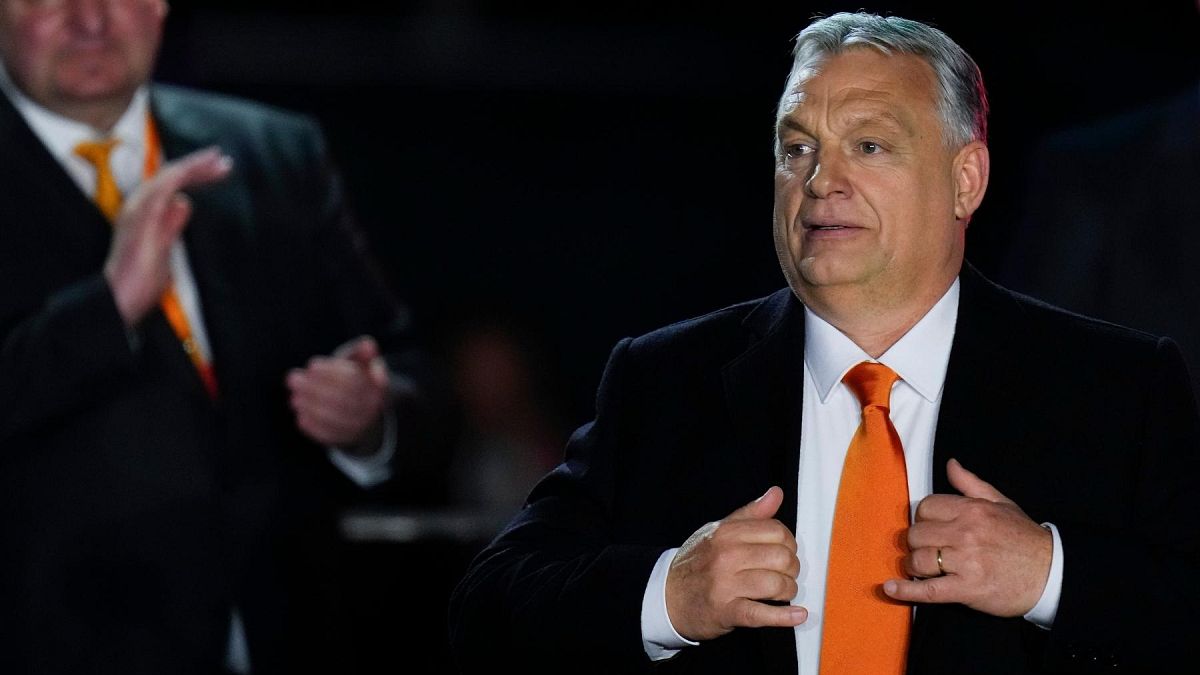Nationalist PM Viktor Orbán has won another two-thirds majority in Hungary's parliament for his Fidesz party, as the unified opposition failed to unseat him.
Incumbent Prime Minister Viktor Orbán has won a fourth consecutive term in office -- his fifth in total -- after a dominant performance at the polls from his nationalist Fidesz party.
Six opposition parties had rallied their efforts to unseat Orbán behind one candidate, Péter Márki-Zay.
However, on polling day their support faltered and they proved no match for Fidesz which has secured another two-thirds majority in parliament.
With around 91% of votes tallied, Orban’s Fidesz-led coalition had won 53%, while a pro-European opposition coalition, United for Hungary, had just over 34%, according to the National Election Office.
Here are five takeaways from Sunday's election.
1. The war in Ukraine helped Orban and Fidesz
The victory comes as war rages in one of Hungary's neighbouring countries, Ukraine, suggesting Orban has benefitted from the "rally around the flag", which sees voters favour incumbent political leaders at times of international crises.
Orban dramatically shifted the tone of his campaign after Russia invaded Ukraine in late February, portraying the election as a choice between peace and stability or war and chaos.
The opposition called for Hungary to support Kyiv and act in unison with the European Union and the military alliance NATO.
But the main message carried on pro-government media claimed the opposition wanted to drag Hungary into the conflict.
Orban, a longtime ally of Russian President Vladimir Putin, has insisted that Hungary remain neutral and maintain its close economic ties with Moscow, including continuing to import Russian gas and oil on favourable terms.
At his final campaign rally Friday, Orban claimed that supplying Ukraine with weapons — something that Hungary, alone among Ukraine’s EU neighbours, has refused to do — would make the country a military target, and that sanctioning Russian energy imports would cripple Hungary's own economy.
Click here to see Monday's latest updates on the war in Ukraine.
2. No end in sight for Hungary's scraps with Brussels
Hungary under Orban has long been at loggerheads with the European Commission in Brussels over issues such as immigration, judicial reforms and media freedom.
This result gives Orban, and his government, a strong mandate to say that Hungarians voted and want them to continue running the country the way they have been, especially when it comes to dealing with European institutions in Brussels.
In his victory speech on Sunday, Orban wasted no time in sending a message to Brussels.
“We won a victory so big that you can see it from the moon, and you can certainly see it from Brussels,” said Orban.
It comes after the European Commission got the legal green light to stop transfers of EU funds to countries that don't adhere to the bloc's core values. It's aimed at the likes of Hungary and Poland and is likely to be a key battleground in the coming months.
3. Hungary's urban-rural divide looks as strong as ever
The results show that Hungary is still divided politically. In the capital Budapest, the six unified opposition parties won the biggest share of the vote. Fidesz dominated elsewhere in the country.
4. Jobbik support ebbs away
The vast majority of Hungary's opposition to Orban had unified behind one candidate -- Péter Márki-Zay -- in a bid to oust the country's long-term prime minister.
Among them was Jobbik, a once far-right party that has moved more mainstream in recent years.
But support for Jobbik -- whether because of this shift to the centre-ground or being in a big-tent opposition diluted its impact -- dropped off on Sunday night.
Voters seem to have switched to Our Homeland Movement (MiHazánk), which came to prominence during the pandemic as an anti-vaccine party.
In a surprise result, the party exceeded the 5% threshold to enter Hungary's parliament.
5. LGBT referendum
As well as the election, Hungarians were also asked to give their opinion on a controversial LGBT referendum.
Voters were asked for their views on legislation that limits schools' teaching about homosexuality and transgender issues.
Critics say the law, passed last year, was discriminatory, contravened European values and equates homosexuality with paedophilia.
The government's response was to offer a referendum, asking the electorate four questions in relation to the legislation.
To be valid, the poll needed to be answered by half of Hungary's registered voters. But with 98% of votes counted, the threshold had not been met. However, of those that did respond, the vast majority backed the government's position.
How Hungary's election night unfolded
Scroll through our updates below to see how Sunday's election night unfolded.


